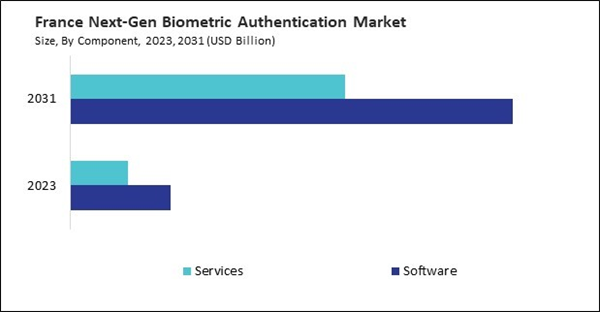The Germany market dominated the Europe Next-Gen Biometric Authentication Market by country in 2023, and is expected to continue to be a dominant market till 2031; thereby, achieving a market value of $10.73 billion by 2031. The UK market is exhibiting a CAGR of 19.2% during 2024-2031. Additionally, the France market is expected to experience a CAGR of 21.4% during 2024-2031.
Biometric authentication ensures secure access to patient records, safeguarding sensitive information. Biometric systems verify the identities of patients and healthcare providers, reducing medical errors and improving patient care. Biometric authentication also facilitates seamless access to electronic health records (EHRs), enabling healthcare providers to deliver timely and accurate treatments.
In the retail sector, biometric authentication enhances customer experience and security. Retailers use facial recognition and fingerprint scanning for personalized marketing, secure payments, and efficient customer service. E-commerce platforms leverage biometric authentication to prevent fraudulent transactions and ensure secure online shopping experiences. Also, educational institutions are adopting biometric authentication to improve security and streamline administrative processes. Biometric systems verify student identities for attendance tracking, exam administration, and access to campus facilities. This ensures accurate record-keeping and enhances campus security.
The growing awareness of the need for secure identification methods, fueled by the rise in property crimes, will also lead to increased regulatory requirements for stronger authentication mechanisms across Europe. Governments may push for adopting next-gen biometric systems to protect citizens’ privacy and security, further boosting market growth. Additionally, industries such as healthcare, travel, and retail will increasingly recognize the value of biometric authentication to prevent theft and fraud, contributing to the expansion of the market. In summary, the increase in theft-related crimes in Europe will likely drive the demand for next-gen biometric authentication solutions.
List of Key Companies Profiled
- Fujitsu Limited
- Thales Group S.A.
- HID Global Corporation
- NEC Corporation
- Aware, Inc.
- Fingerprint Cards AB
- IDEMIA SAS
- M2SYS Technology, Inc.
- CardLogix Corporation
- Touchless Biometric Systems AG
Market Report Segmentation
By Component- Software
- Services
- Single-factor Authentication
- Multi-factor Authentication
- Fingerprint Recognition
- Facial Recognition
- Iris Recognition
- Voice Recognition
- Palm Vein Recognition
- Signature Recognition
- Other Technology
- Government
- BFSI
- Travel & Immigration
- Home Security
- Healthcare
- Defense
- Other End Users
- Germany
- UK
- France
- Russia
- Spain
- Italy
- Rest of Europe
Table of Contents
Companies Mentioned
- Fujitsu Limited
- Thales Group S.A.
- HID Global Corporation
- NEC Corporation
- Aware, Inc.
- Fingerprint Cards AB
- IDEMIA SAS
- M2SYS Technology, Inc.
- CardLogix Corporation
- Touchless Biometric Systems AG









